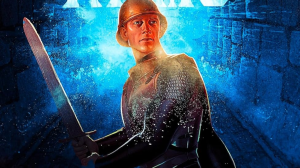
All-America Comix #1 arrives in stores today, nearly four years after it was first announced. The Image Comics one-shot, which reunites writer Joe Casey and artist Dustin Nguyen, is sure to grab the attention of fans—largely for its similarities to another corner of the comics world. Much of All-America Comix‘s buzz has centered around the character’s similarities to America Chavez/Miss America, a Marvel character co-created by Casey and Nick Dragotta in 2011. While America Chavez has gone on to be embraced by Marvel fans in titles like Young Avengers and West Coast Avengers, as well as in the popular Marvel Rising media franchise, All-America Comix attempts to reclaim Casey’s original concept of the character—but it simultaneously loses something along the way. All-America Comix #1 has some strong qualities narratively and aesthetically, but its overall sense of purpose feels incredibly small-minded.
Videos by ComicBook.com
All-America Comix opens with America Vasquez engaged in a very specific battle which—without moving heavily into spoilers—sets out to be a modern-day version of Steve Gerber’s Howard the Duck own attempt to reclaim his creation in 1996. From there, we are shown disparate scenes of America’s life as a teenage superhero, which are interspersed with her Instagram-like captions. We see her butting heads with a group of superheroes (who, with names like “WMD Man,” “Colonel Free,” and, simply, “Thor”, are clearly trying to emulate a certain group of Marvel characters), meeting up with her best friend, and getting into a fight with several familiar-looking supervillains. When America’s dimension-traveling powers take an unexpected turn, she begins to question her own sense of reality.
The concept of a female superhero finding her place in the world is certainly nothing new, nor is the idea of a character realizing that their reality is orchestrated by some outside force. That makes the implementation of both of these plots in All-America Comix somewhat underwhelming, as the issue only scratches the surface of its own potential. There’s also the confusing nature of the title’s release—despite being clearly billed and solicited as a one-shot, the issue spends a lot of time teeing up a future narrative, without any guarantee that the story will continue. While there are moments In All-America Comix that are definitely entertaining, and there’s something charming about seeing how other Marvel concepts are filtered through the story, that is largely overshadowed by the tone of the issue. The choice to use social media captions as narration has potential, but the littering of nonsensical hashtags and phrases, and an awkward sentence structure, make much of it clunky to read. The actual dialogue also has some cringeworthy moments—particularly the unironic use of the word “screenager,” as well as America saying “ok, boomer” and “weird flex, but whatever” in the same breath—which come across as a poor parody of how young people talk.
There’s also the entire mission statement of All-America Comix itself, as Casey has expressed a desire to execute “a definite vision,” as opposed to allowing a character to become “open-source” and influenced by the opinions of the character’s fans. While the idea of executing the idealized version of a character is admirable, one of the best things about the medium of comics has been seeing different creative teams develop their own perspective with a certain character. (Also, the idea of fans influencing the plots of comics is nothing new, from the members of the Justice Society of America in the 1940s to the death of Jason Todd in the 1980s.) A microcosm of that has been seen in the near-decade since America Chavez’s first appearance, with her backstory and characterization being fleshed out by Kelly Thompson in West Coast Avengers and Gabby Rivera in the America solo series. Casey, a white man, feeling the need to “reclaim” the Latin-American, LGBTQ+, female character he co-created reads uncomfortably amidst the current conversation about diversity in the comics industry, especially when the finished product doesn’t pack enough punch to justify the drama.
One of the strongest assets of All-America Comix is its art, with Dustin Nguyen bringing a kinetic, salt of the earth energy to many of the issue’s sequences. There are moments where the art is inconsistent (particularly within a handful of faces, which read like they were superimposed onto a completely different head), but they don’t distract much from the overall aesthetics. A sequence at the middle of the issue really lets Nguyen’s artwork shine, crafting a cerebral world that is complimented by Brad Simpson’s dreamy colors. Sonia Harris’ design work and Rus Wooton’s letters also help tie the whole thing together, without ever distracting from what’s happening on the page.
All-America Comix #1 is an admirable, but somewhat-baffling read, which tries to return to a similar territory as Marvel’s America Chavez under the Image Comics brand. Maybe it’s the fact that the project has been in the works for four years, during which America Chavez has evolved into a cult character, but the issue largely comes across as something seeking to be preserved in amber. The script and art fluctuate between being impactful and awkward, resulting in an execution that ultimately doesn’t break as much creative ground as it intends. Ultimately, All-America Comix #1 feels like a generic version of your favorite snack food—it’s enjoyable, and it gets the job done at the moment, but you’re ultimately left wanting more of the real thing.
Published by Image Comics
On July 1, 2020
Written by Joe Casey
Art by Dustin Nguyen
Colors by Brad Simpson
Design by Sonia Harris
Letters by Rus Wooton








